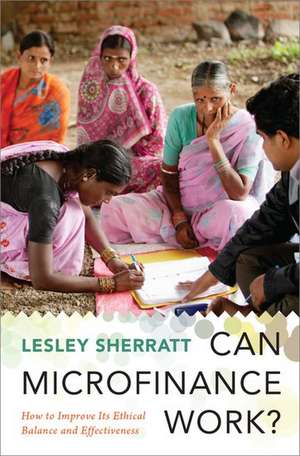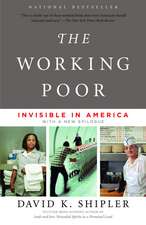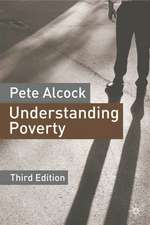Can Microfinance Work?: How to Improve Its Ethical Balance and Effectiveness
Autor Lesley Sherratten Limba Engleză Hardback – 11 feb 2016
Preț: 345.27 lei
Preț vechi: 421.60 lei
-18% Nou
Puncte Express: 518
Preț estimativ în valută:
66.07€ • 69.15$ • 54.99£
66.07€ • 69.15$ • 54.99£
Carte tipărită la comandă
Livrare economică 20-26 martie
Preluare comenzi: 021 569.72.76
Specificații
ISBN-13: 9780199383191
ISBN-10: 0199383197
Pagini: 254
Dimensiuni: 236 x 157 x 25 mm
Greutate: 0.5 kg
Editura: Oxford University Press
Colecția OUP USA
Locul publicării:New York, United States
ISBN-10: 0199383197
Pagini: 254
Dimensiuni: 236 x 157 x 25 mm
Greutate: 0.5 kg
Editura: Oxford University Press
Colecția OUP USA
Locul publicării:New York, United States
Recenzii
A challenging and penetrating study of microfinance, with lessons to be learned for everyone who cares about ethical standards, not just in microfinance but in the wider banking sector.
Sherratts book is a rarity: penetrating philosophical analysis informed by an insiders knowledge of the subject matter. Her experience working in the financial sector, combined with her skills as a philosopher, have enabled Sherratt to produce an original, thought-provoking, and balanced investigation of microfinancing.
This book is a must-read for those interested in supporting poor populations in developing world to help themselves. Microfinance was initially sold to the world as the magic bullet, but years of research have highlighted the flaws in the model and its impact on poor people. Lesley Sherratt asks the right questions: how can we make microfinance work, not just based on a sales pitch, but using a careful evidence-based and ethical assessment on its potential, practice, and consequences.
Can Microfinance work? offers a salutary lesson, not only for those who may still believe that microfinance is a panacea against poverty, but for all of us who are liable to be swept up in a wave of enthusiasm for an untested idea about which an attractive story can be told. As Sherratt demonstrates in this excellent and concise book, we should not jump on a bandwagon without both good evidence and good ethical analysis of the direction in which it is heading.
This book exemplifies how philosophical tools can be put to work in examining pertinent issues in development policy. Sherratt presents an unflinching picture of the practice, to date, of microfinance for development, and she carefully lays out both the evidential and ethical considerations that ought to bear on the on-going assessment and reform of this industry. This is a thoroughly engaging and important book.
Sherratts book is a rarity: penetrating philosophical analysis informed by an insiders knowledge of the subject matter. Her experience working in the financial sector, combined with her skills as a philosopher, have enabled Sherratt to produce an original, thought-provoking, and balanced investigation of microfinancing.
This book is a must-read for those interested in supporting poor populations in developing world to help themselves. Microfinance was initially sold to the world as the magic bullet, but years of research have highlighted the flaws in the model and its impact on poor people. Lesley Sherratt asks the right questions: how can we make microfinance work, not just based on a sales pitch, but using a careful evidence-based and ethical assessment on its potential, practice, and consequences.
Can Microfinance work? offers a salutary lesson, not only for those who may still believe that microfinance is a panacea against poverty, but for all of us who are liable to be swept up in a wave of enthusiasm for an untested idea about which an attractive story can be told. As Sherratt demonstrates in this excellent and concise book, we should not jump on a bandwagon without both good evidence and good ethical analysis of the direction in which it is heading.
This book exemplifies how philosophical tools can be put to work in examining pertinent issues in development policy. Sherratt presents an unflinching picture of the practice, to date, of microfinance for development, and she carefully lays out both the evidential and ethical considerations that ought to bear on the on-going assessment and reform of this industry. This is a thoroughly engaging and important book.
Notă biografică
Lesley Sherratt lectures in global business ethics at Kings College, London and is a Director of Temple Bar Investment Trust. Her degree in Politics, Philosophy and Economics was from Oxford University, and her PhD on the ethics of microfinance from Kings College, London. She was formerly CEO and CIO, Ark Asset Management Ltd; Investment Director, Save & Prosper and Fleming Flagship ranges of funds; Head of Global Portfolios and Director, Fleming Investment Management; Chair, US Smaller Companies Investment Trust; and a former Member, Microloan Foundation Advisory Board.















